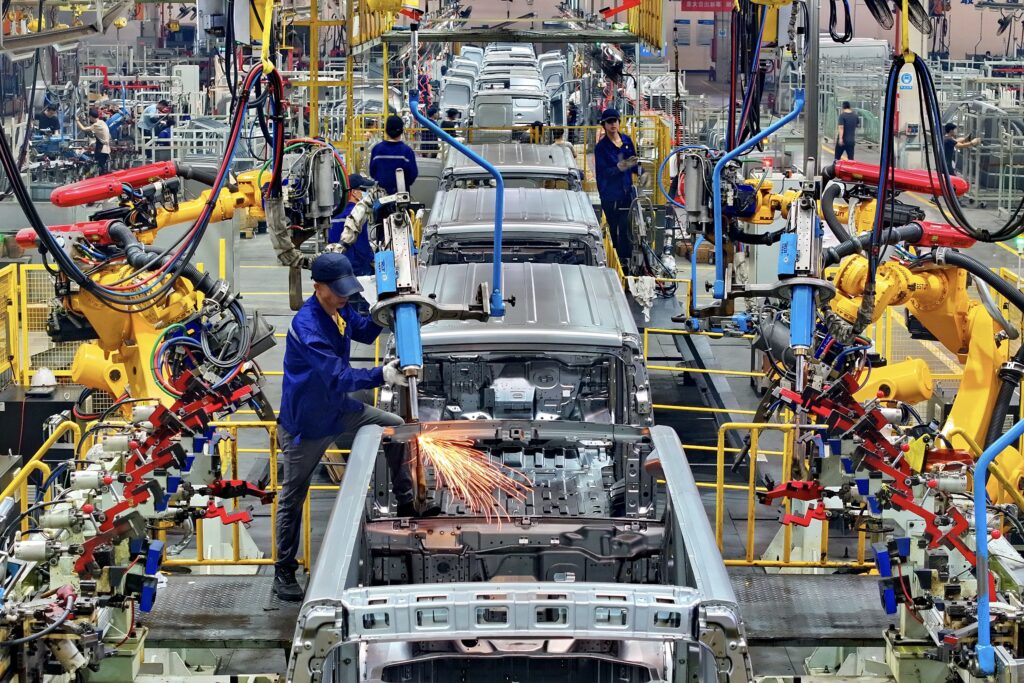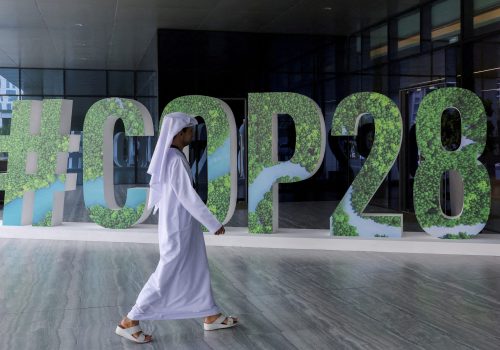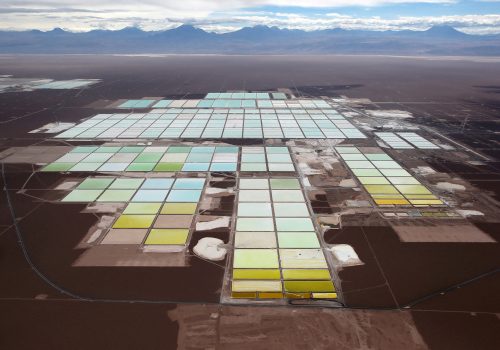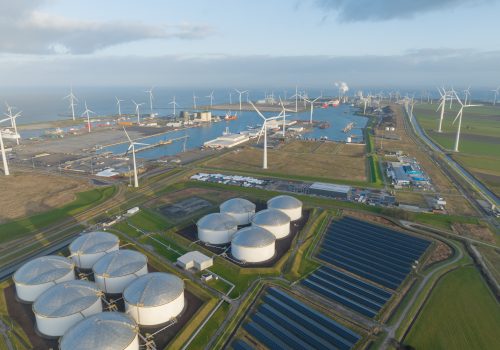The United States has a lithium problem. More precisely, US demand for lithium is growing exponentially while access to secure supplies of lithium is becoming more tenuous. But it isn’t the United States’ ubiquitous use of products such as smartphones, laptops, and Bluetooth headphones—or even the demand for life-saving devices such as pacemakers and carbon-monoxide detectors—that is causing the problem. The amount of lithium used in these products is tiny compared to the lithium needed for electric vehicles (EVs), semiconductors, and specialized batteries. The average EV battery, for example, needs about eight kilograms of lithium, whereas an iPhone battery uses less than one gram of the metal.
The United States desperately needs to hasten the development of supply chains for critical minerals that don’t involve China and Chinese companies for both commercial and national security interests. Unfortunately, current policies, including regulations from the Inflation Reduction Act (IRA), are doing exactly the opposite. They are hurting demand for electric vehicles, the very products that will incentivize the development of these supply chains. Instead, Washington needs to unleash the power of the US market by removing barriers to accessing capital, fast-tracking manufacturing, providing high-level diplomatic support, and promoting domestic demand.
An issue of national security
The erosion of the US manufacturing industry and its outsourcing to factories in Asia is a well-known and well-studied phenomenon. The risks of completely outsourcing the production of key goods, such as antibiotics, have recently come to light. The US military could face similar situations with battery and semiconductor supplies, threatening the security and safety of US interests around the world.
The global lithium-ion battery industry is dominated by China. Chinese companies supply 80 percent of the world’s battery cells and account for nearly 60 percent of the EV battery market. Even some US companies that produce batteries rely on lithium-ion cell components produced by Chinese manufacturers.
But not all lithium-ion batteries are the same. The US military needs specialized batteries that are larger, of higher quality, greater power density, and packaged to withstand significantly more rough treatment than those needed for commercial purposes. Should the US military suddenly find itself in need of more specialized batteries, the Pentagon might not be able to obtain them because foreign lithium-ion cell producers have little incentive to stop producing lithium-ion batteries for their commercial customers and divert production to the specialized products that US military battery manufacturers need. If these suppliers are controlled by Chinese government interests, they may even be incentivized not to provide military products for the United States, even if offered financial incentives. These risks have been known for some time—in fact, an unclassified report by the Interagency Task Force in Fulfillment of Executive Order 13806 described these vulnerabilities in 2018.
China controls access to critical minerals
China’s supremacy over the lithium supply chain is no accident. China purposefully and through insidious methods engineered control over the global lithium supply chain. According to a 2021 White House Report, the Chinese government funneled $100 billion in subsidies, rebates, and tax exemptions to Chinese companies and Chinese consumers between 2009 and 2019 to dominate the global lithium refining industry, before global demand for lithium soared. China then used its position as the top consumer of unrefined lithium and top producer of refined lithium to keep others from entering the market. This included anti-competitive practices such as subsidizing production when demand was not high enough and dumping products at below-market prices onto the international market.
Chinese investments in lithium mines around the world also ensure that Chinese companies have primary access to this important element. Beijing has engaged in similar practices with other critical minerals, such as cobalt, graphite, and nickel.
Electric vehicles and national security
According to a recent study by McKinsey, global demand for lithium-ion batteries is forecast to grow from about 700 gigawatt hours (GWh) in 2022 to 4,700 GWh by 2030. This is in large part due to clean-energy policies that promote the adoption of electric vehicles. The United States and Europe are expected to experience the highest rates of growth.
China is not only primed to make hundreds of billions of dollars in revenue, but it is also positioned to restrict access to lithium-ion batteries to certain countries or companies as it wishes. This puts the national security of the United States and its allies at risk. In the event of a war or sudden need to supply an ally or strategic partner with military aid, the United States could face severe shortages of key defense products, such as drones, F-35 fighter jets, surface-to-air missiles, and even radios.
Current policy impediments
There are alternatives to lithium-based batteries under development, but these are likely many years away from entering the market. A better solution is to develop new supply chains that don’t depend on China or Chinese companies for critical minerals, including lithium. Though the process seems daunting because China dominates the market now, it is possible if the United States makes it not just a matter of environmental or energy policy, but a national security priority, as well. It is vital to get the energy transition right, without threatening national security in the process. Unfortunately, current policy is doing the opposite.
The IRA acknowledged the problems posed by China’s domination of critical minerals supply chains and tried to address it through tax incentives for electric vehicles. In order for vehicles to qualify for the full tax credit ($7,500) a certain percentage of the value of the battery component cannot originate in China and must be produced or manufactured in North America. Lawmakers hope that consumer demand for vehicles that qualify for the maximum tax credit will drive manufacturers to open supply chains for these components that do not involve China or Chinese companies.
The problem is that these regulations take effect this year, with even more stringent regulations set to take effect in 2025. But critical mineral mining, refining, and battery manufacturing cannot be developed in this time frame while also adhering to the environmental, safety, labor, and financial regulations that US and European companies must respect.
As battery and automobile manufacturers struggle to source battery components from domestic and free-trade partner sources, consumer demand for electric vehicles is sitting on the precipice. Many electric or plug-in hybrid vehicles are, at the point of sale, more expensive than otherwise similar cars that run on gasoline. But a $7,500 federal tax credit provided at the time of purchase, especially when combined with some state tax credits, brings many more vehicles into the range of affordability.
Now that many electric or plug-in hybrid models aren’t eligible for the full tax credit, consumer demand will fall. Without robust consumer demand, car manufacturers will quickly lose the incentive to produce and market EVs to American drivers. In fact, they are already seeing weakening demand and responding by slashing production. In December 2023, Ford said that it would reduce the production of its all-electric F-150 Lightning pickup in 2024 to half of its 2023 output, for example. The policy intended to incentivize new lithium-ion battery supply chains is now more likely to disincentivize it by wounding consumer electric vehicle demand.
How to supercharge a lithium industry
US policymakers need to respond quickly, because it is much easier for the market to cut the supply of EVs to match slowing demand than it is to build up new supply chains for critical minerals and build battery factories. Below are three steps to address this situation.
First, suspend implementation of the IRA EV battery regulations for battery components for 2024 and 2025. It is not feasible to offer tax credits that can only be applied to a handful of vehicles. The market for electric vehicles is already problematic as consumers realize that fully electric vehicles still suffer from range issues as batteries start to degrade, don’t perform at full range when subjected to extreme temperatures, and cannot always be reliably charged in reasonable amounts of time away from home.
Most consumers may continue to conclude that an EV just isn’t worthwhile for the price tag. But more consumers might be enticed with the full federal tax credit. If the federal government really wants to see new supply chains for lithium-ion batteries, it needs to give the market time to invest in them, and stimulating consumer demand is a key component.
Second, support lithium and other critical mineral refining in the United States. The United States is never going to be able to mine enough critical minerals to satisfy all of its demand. However, discoveries of deposits of important critical minerals in countries that China has not penetrated are growing. The problem is that China totally dominates the refining process. Even some critical minerals mined in the United States are sent to China for refining.
Government loans and grants are helpful for big, established companies, but the industry needs diversification. Smaller companies working on innovative refining processes face too many barriers to access the capital they need to build manufacturing facilities, both from the government and from private sources. The government should elevate the development of lithium refining businesses in the United States to a national security priority and eliminate barriers that prevent smaller entrepreneurial operations from accessing federal funds.
If the government wants lithium refining in the United States to succeed, private capital will also start to see it as an industry to invest in. The United States can and should become a hub for innovation in critical mineral refining because the applications go much farther than the rechargeable battery industry. Robust and diversified domestic lithium refining will ensure that the US military will always be able to procure the supplies it needs on the free market.
Third, support the development of mining, transportation, and refining of critical minerals and the manufacturing of products in friendly countries. The United States should work with its North American neighbors, Canada and Mexico, to support these supply chains. There are also several countries with significant lithium deposits in the Western Hemisphere, including Brazil, Chile, Argentina, and Canada.
Canada does not currently produce much lithium, but the potential there is significant. US trade initiatives could help establish a supply chain for lithium that exists entirely within North America. This would benefit both countries’ economic and national security endeavors.
In South America, US diplomats can help US companies negotiate rights to mine critical minerals in safe and environmentally secure ways, just as they worked to help US oil companies develop foreign oil supplies in the twentieth century. During the Cold War, this was considered a top national security priority. In the twenty-first century, critical mineral mining and refining should receive the same considerations from the US State Department.
Ellen R. Wald is a nonresident senior fellow with the Atlantic Council Global Energy Center and the co-founder of Washington Ivy Advisors.
Further reading
Thu, Nov 30, 2023
Expert analysis: The successes and shortcomings in the fight against climate change at COP28
New Atlanticist By
Our experts dispatched to Dubai, where they analyzed how global leaders responded to the greatest challenges posed by climate change.
Fri, Apr 28, 2023
Lithium drives the energy transition. Will Chile’s plan to nationalize production be a speed bump?
New Atlanticist By Ignacia Ulloa Peters, William Tobin
While state control of resources in Latin America regularly raises the alarms of investors, Chile's strong institutions and previous success create a positive outlook for its ability to deliver.
Thu, Nov 30, 2023
The 2024 Global Energy Agenda
Global Energy Agenda By
The fourth edition of the Global Energy Agenda kicks off with a collection of essays by energy leaders that are rolling out during COP28. Rounding out the Agenda in early 2024, the Atlantic Council Global Energy Center will release the results of its annual survey of experts that takes the pulse on the geopolitical risks affecting energy markets, the future of fossil fuels, and the transition to clean energy.
Image: Robotic arms and employees weld parts of electric express delivery vehicles on the assembly line at a factory on October 9, 2023 in Ganzhou, Jiangxi Province of China. (Photo by Zhu Haipeng/VCG)



